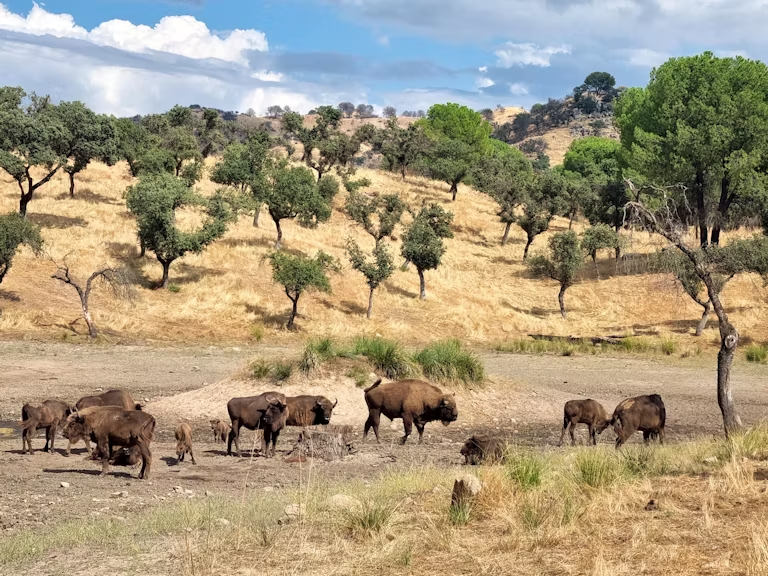Rewilding Britain in Five Years
Rewilding Britain turns five! Here’s a snapshot of our key achievements and influences so far.
Published 14/07/2020
Where it all began
Five years ago today, a small group of individuals met for the first time. They shared a passion for nature and a rich understanding of the environmental and conservation movement. They were deeply concerned about the staggering loss of wildlife in Britain and challenged the impact of existing conservation practices. They wanted a new, ambitious model that works to reverse the decline of British wildlife.
The result was the creation of the first and only country-wide organisation in Britain focusing on rewilding and the amazing benefits it can bring for people, nature and climate. Rewilding Britain was born.
Rewilding before us
Five years ago, Rewilding Britain was born. Rewilding was a new idea for most people – exciting for many and threatening to others. It certainly stimulated debate across the country. More than anything it started a shift in people’s perceptions of nature and how we use land, and what might be possible in the fight against climate change and species extinction.
Rewilding now
Today, rewilding is well on the way to becoming mainstream. We like to think we’ve played a part in making this happen by:
- Adopting an accepted definition of rewilding and ensuring it is more widely understood.
- Defining a set of pragmatic principles and priorities to back this up.
- Leading targeted high-level meetings with key policy decision-makers.
- Widely promoting the positive benefits of rewilding on land and in seas.
- Producing research to evidence the impact of rewilding.
- Catalysing support from enthusiasts, sharing expertise and information.
- Showcasing and supporting pioneering rewilding examples and the vital importance of local engagement.
As a result, we’re now receiving an incredible number of enquiries from landowners, businesses, NGOs, local government and communities large and small wanting help and advice on rewilding. Over the last year alone more than 50 private landowners have contacted us with over 100,000 acres of land between them with potential for rewilding. Our support, advice and introductions to other enthusiasts and practitioners have helped them adopt rewilding, or to seriously consider it.
We’re still in ongoing discussions with the UK government to mainstream rewilding into key government policies. This includes the Agriculture Bill, the associated Environmental Land Management scheme and the Environment Bill. Throughout these discussions we have been strongly supported by several MPs across all key parties and by members of the House of Lords, whilst the chairman of Natural England, Tony Juniper, describes rewilding as “a massively important part of the Nature Recovery Network”. In Scotland, we’re also working as part of the Scottish Rewilding Alliance on a set of key policy asks.
Within five years, this positive shift in attitudes and support for rewilding at all levels has been truly remarkable. We’ll continue playing a major role, catalysing this support and appetite to massively upscale rewilding across Britain, a vision delivered on the ground by landowners and local communities.
Today, we celebrate our first five years. Here’s a snapshot of our key achievements and influences so far.
July 2015: Rewilding Britain is born!
Our website is launched. Rewilding Britain’s birth as an organisation is announced!
Autumn 2015: Our first employees
Helen Meech was recruited as our first director. She was closely followed by David Balharry as our Scotland director on secondment from the Scottish Government. We could only start to exist as an organisation thanks to the amazing support and encouragement from some key funders, including Esmée Fairbairn Foundation, Garfield Weston Foundation, John Ellerman Foundation, Lund Trust and in-kind support from Friends of the Earth. We are also enormously grateful to all the individuals who contributed to our work — many of whom still support us to this day.
March 2016: Chris Packham lends his support
In conversation with our director, Chris shared his views on rewilding and hopes for the future in a series of short videos. You can watch them here .
August 2016: Sparking debate
Our director joined a panel discussing rewilding at Birdfair, hosted by Chris Packham.
September 2016: Launching our ‘How rewilding reduces flood risk’ report
We published our first report, ‘How rewilding reduces flood risk’. It highlights the key role of taking a natural approach (including rewilding) to flood management that repairs and revitalises Britain’s broken ecosystems. One result was a government pledge of £15 million for natural flood management, something that our current director, Alastair Driver, had a key hand in securing in his previous role as head of conservation for the Environment Agency.

November 2016: A boost for beavers
We supported Devon Wildlife Trust with their appeal for the River Otter beaver project, which is still going strong!
December 2016: Publishing the Rewilding Knowledge Hub
This report, summarising rewilding research, is still used by students and researchers today.
January 2017: New Directors
Rebecca Wrigley and Alastair Driver join Rewilding Britain to lead the organisation.
January-April 2017: Mapping our progress
We undertook a review of the first 18 months to assess progress and agree where we could most effectively focus our efforts. This led to renewing our efforts to catalyse landscape-scale work spanning 1000s of acres as well as engaging more people in the debate about rewilding.
August 2017: Rewilding Britain and Rewilding Europe join forces
We signed a ‘Collaborative Rewilding Agreement’, marking the start of a shared intent to coordinate our rewilding and communication activities. Together, we enhance the understanding, support and implementation of rewilding in Britain and Europe.
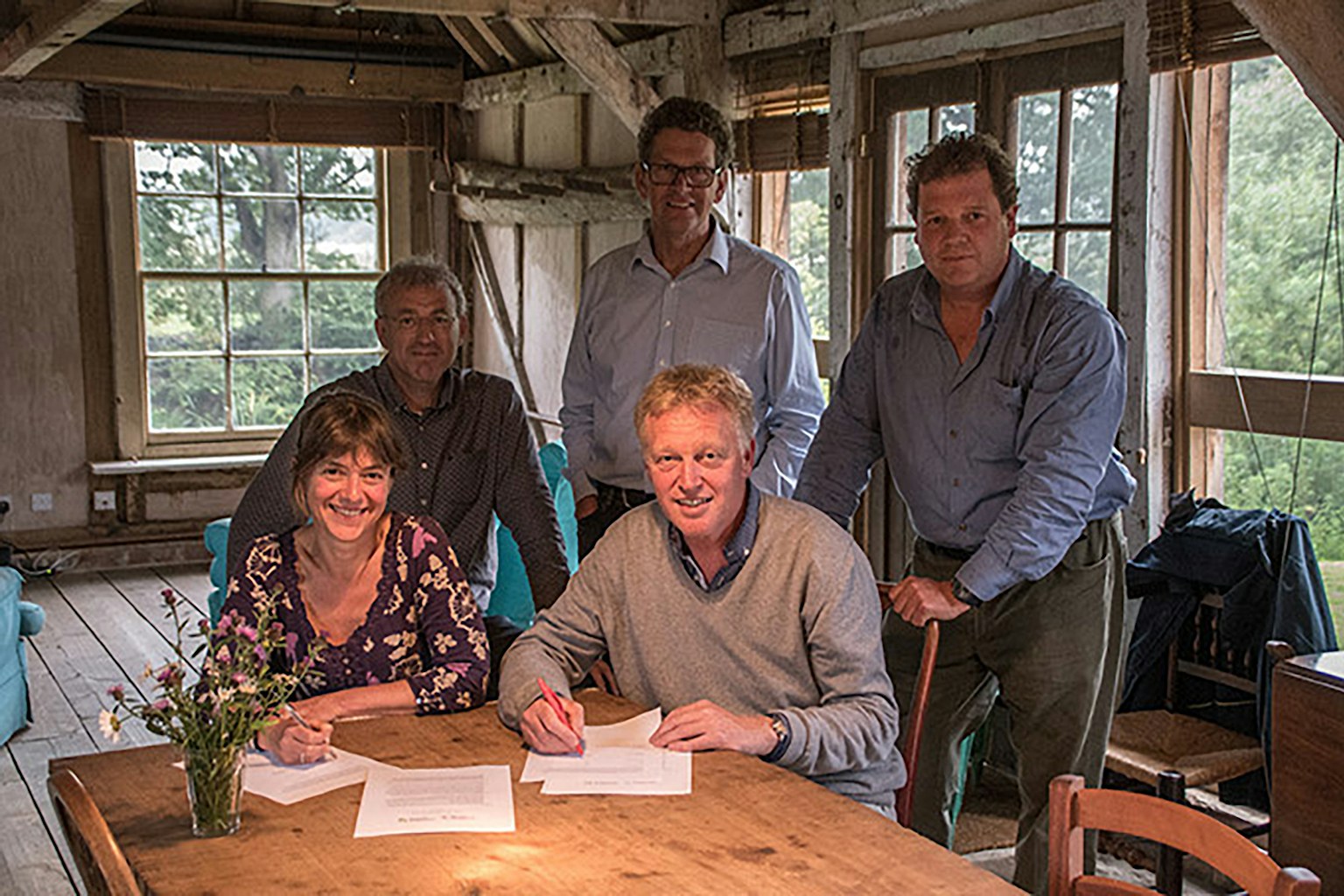
September 2017: Publishing our principles of rewilding
These are the same principles we use today.
December 2017: Broadening the debate
Our director, Alastair opened a dialogue with senior policy leads at the National Farmers Union, CLA, Countryside Alliance and Uplands Alliance etc. on the merits of rewilding and myth-busting. The debate continues and has been vital for raising concerns as well as finding common ground.

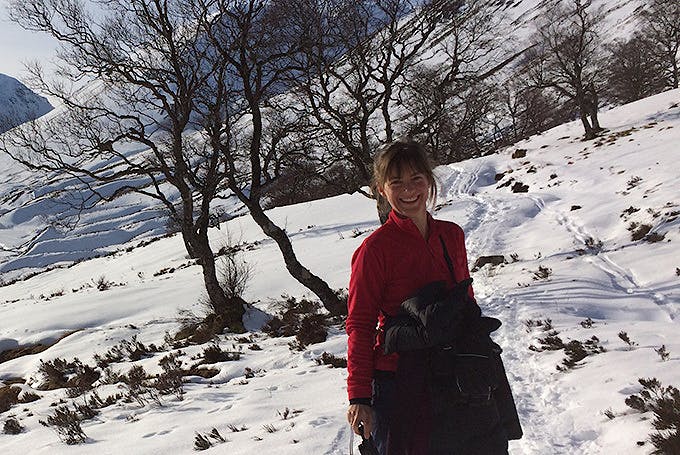
Watch our five-year anniversary webinar
On the fifth anniversary of the launch of Rewilding Britain, our founder and chief executive Rebecca Wrigley opened up to an audience of supporters, for our first-ever webinar , to talk about the achievements and challenges so far.
January 2018: Influencing the 25 Year Environment Plan
The Government published its 25 Year Environment plan . We got a mention to support restoring ecosystems, and it cited Knepp Estate as a prime example of lowland rewilding. This was the beginning of the ‘Public money for public goods’ policy change that is currently advancing with the Environmental Land Management consultation.
October 2018: Supporting the Summit to Sea Project
We played a key role in securing funding for the Summit to Sea project in 2018, and played a short-term role in leading the project’s formation. Whilst it has faced its challenges and opposing voices the project is now being co-designed with local communities. We’re proud to have helped get it up and running.
November 2018: Initiating visionary rewilding projects
After nearly two years of travelling the length and breadth of England to meet with numerous stakeholder organisations to scope the opportunities, our director Alastair, convened the first meeting of our first vision-scale initiative — the Wild Peak Vision. This meeting involved the RSPB and the Derbyshire Wildlife Trust (DWT) and the latter agreed to lead the initiative from that point on. Informal consultation then commenced with local landowners, community groups and stakeholder organisations.
April 2019: Launching our petition calling on the UK Government to restore nature on a massive scale to help stop climate breakdown
We launched a petition to call on the UK government to make a bold financial and political commitment to nature’s recovery. The petition asked the government to avoid a climate emergency by drawing millions of tonnes of CO2 out of the air through restoring, rewilding and protecting our environment.
Within two months, 100,000 people had signed to show their support, triggering a debate in parliament.
May 2019: Launching our new report: How restoring nature can help decarbonise the UK
Our report demonstrates how rewilding and other natural climate solutions can draw millions of tonnes of carbon from the atmosphere by restoring and protecting our living systems. Evidence suggests they could provide over a third of the greenhouse gas mitigation required globally between now and 2030. Yet so far they have attracted only 2.5% of funding for mitigation and far too little political attention.
In advance of the government’s debate, we presented MPs and key organisations with this report, showing the government how much of what type of habitat could be restored. We showed them why it should be restored and how much it would cost, using carbon markets to finance it.
October 2019: Parliamentary debate
The debate took place in October with a key group of MPs engaging in enthusiastic discussion on the merits of rewilding and voting unanimously in favour. Lord Zac Goldsmith referred to it as “perhaps, the most important issue of all”. He said that “rewilding is essentially integrating natural processes into land management” and outlined what the government is doing.
He acknowledged that without radical intervention we are heading for a 3 degree Celsius rise in global temperatures. He confirmed that the government will double its spending in tackling climate change in the period 2021 – 2026, with a large focus on natural climate solutions. He also committed to banning the burning of upland peat bogs, saying the government is now developing a legislative response because the voluntary approach has not worked.
November 2019: Nature for Climate Fund
The Government announced the £640M Nature for Climate Fund, which was set up to deliver exactly what we were calling for in our decarbonising report. Lord Zac Goldsmith confirmed to Rewilding Britain that our petition and debate created a major difference in raising awareness of the role rewilding has to play in restoring nature in the UK, helping to secure this £640 million. We can’t thank our supporters enough for rallying behind us to trigger this debate and increasing pressure on the government to draw millions of tonnes of CO2 out of the air through restoring, rewilding and protecting our environment.
December 2019: Securing rewilding as a theme on The Archers
Encouraged and advised by us, the Archers commenced an ongoing storyline on rewilding.
December 2019: Help launching the Scottish Rewilding Alliance
Scottish Rewilding Alliance, which launched at the Big Picture conference. It’s ‘a collaboration between like-minded organisations who share a mission to enable rewilding at a scale new to Scotland’. Membership is growing including RSPB Scotland, Trees for Life, John Muir Trust, SCOTLAND: The big picture, and many more.
March-April 2020: Mainstreaming rewilding into government policy
We’ve been working closely with landowners to collate evidence on why rewilding should be included in the Environmental Land Management (ELM) scheme. We’ve also rallied people to support our call for rewilding to be a specific option in the future ELM scheme.
July 2020: Rewilding the House of Lords
As a direct result of our communication with selected members of the House of Lords, the House held a discussion on rewilding during their second reading of the Agriculture Bill. This centred around an amendment proposed by Lord Greaves to specifically mention rewilding in the Bill as one of the activities which could be funded under the future ELM scheme. Many members spoke during the discussion and there was plenty of support for the Rewilding Britain definition and principles, which were quoted by Lord Greaves.
Ultimately, the amendment was withdrawn as the Minister confirmed that because rewilding was accepted as beneficial to biodiversity and public goods, it would automatically be considered to be something which could be funded under the new scheme anyway. We will continue to press for the specific inclusion of rewilding in the guidance for landowners on the list of activities which could be funded through Tier 3 of the proposed ELM scheme.
July 2020: Rewilding Britain turns five!
July 2020: Influencing other bodies to include rewilding in their response to the ELM consultation
Working closely with Wildlife and Countryside Link, we helped them place the right emphasis on rewilding in their response to Defra’s ELM consultation. They included strong support for a call for rewilding to be a key option for landowners under Tier 3 of the scheme:
“Tier 3 should therefore explicitly incentivise rewilding projects, which almost always require initial multiple interventions in order to restore natural processes, often by stepping back from active management over time and, where appropriate, reintroducing or replicating the functions of missing species. Because rewilding involves being less prescriptive and reducing management over time,it is likely to be more affordable than the creation of habitats which need to be managed.” You can read their full response here , with a focus on rewilding in pages 13 – 14.
Other like-minded organisations such as Heal Rewilding have also followed our lead and submitted comprehensive responses calling for the inclusion of rewilding in ELM.
July 2020: Mainstreaming rewilding in government policy
A keynote speech given by Lord Goldsmith entitled “A green recovery”, summarised the need for UK leadership on nature and climate as we set out our priorities for restoring the natural world in post-Covid economic recovery.
In that important speech, we were delighted to hear that the government intends to mainstream rewilding, and even more so with a direct acknowledgement to Rewilding Britain for our ‘fantastic influence on the national debate around rewilding’ adding that we can ‘personally take credit for rewilding having become slightly more mainstream than it was’.
Very significantly, Lord Goldsmith went on to confirm that (i) he expects the Nature for Climate fund “to place a lot of importance on rewilding” (ii) that he expects there to be “a recognition of the value of rewilding in ELM” and (iii) that the government is now “looking very closely at delivering a riparian programme – ie rewilding and planting etc either side of waterways, to help create an informal nature network across the country”.
Lord Goldsmith finished by saying that Rewilding Britain will be “very much involved in those discussions” and will be coming to us for more information. He said, “I’m absolutely convinced that we need to get the incentives right to reward, and incentivise a much greater uptake of rewilding.”
You can watch the full speech here .
What’s next for Rewilding Britain?
We are establishing a pioneering, collaborative Rewilding Network that will give people the practical tools and connectivity they need to make positive changes for rewilding across Britain. This will upscale the area of rewilding by at least 120,000 hectares across Britain by 2022.
We’re also working to massively increase the ambition for nature’s recovery through encouraging the expansion, enhancement and connection of a rich mosaic of rewilding areas and biodiverse habitats on land and sea across Britain.
We need your support more than ever — to spread the word, to help fund us and to take action to make rewilding a reality. Today we send a massive thank you to everyone who’s supported and championed us for the last five years on our exciting journey.
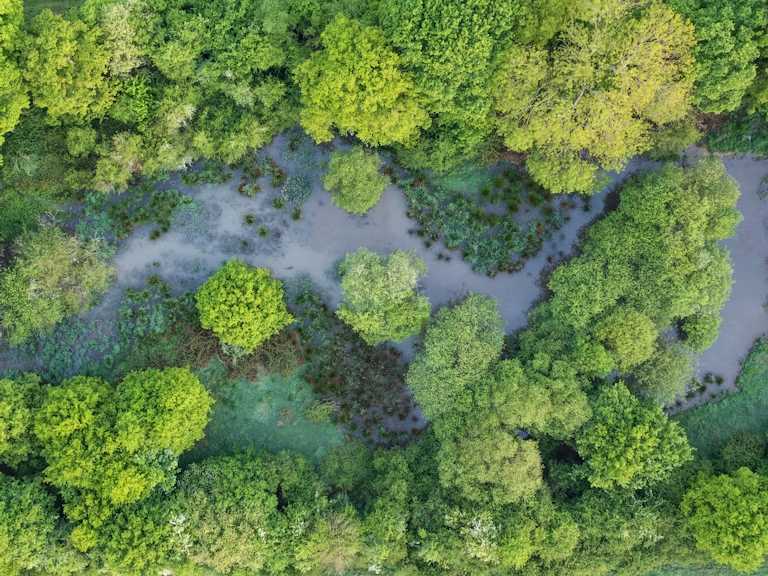
Explore our Rewilding Manifesto
We need UK Government to Think Big and Act Wild for nature, people and planet.
Learn more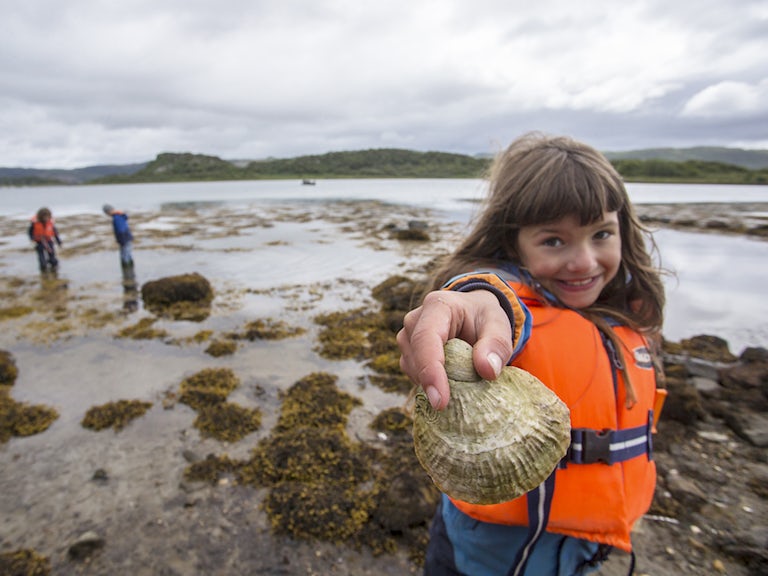
Our vision
We have big ambitions. Find out what we’ve set out to achieve through rewilding.
Our 2025-2030 strategy


